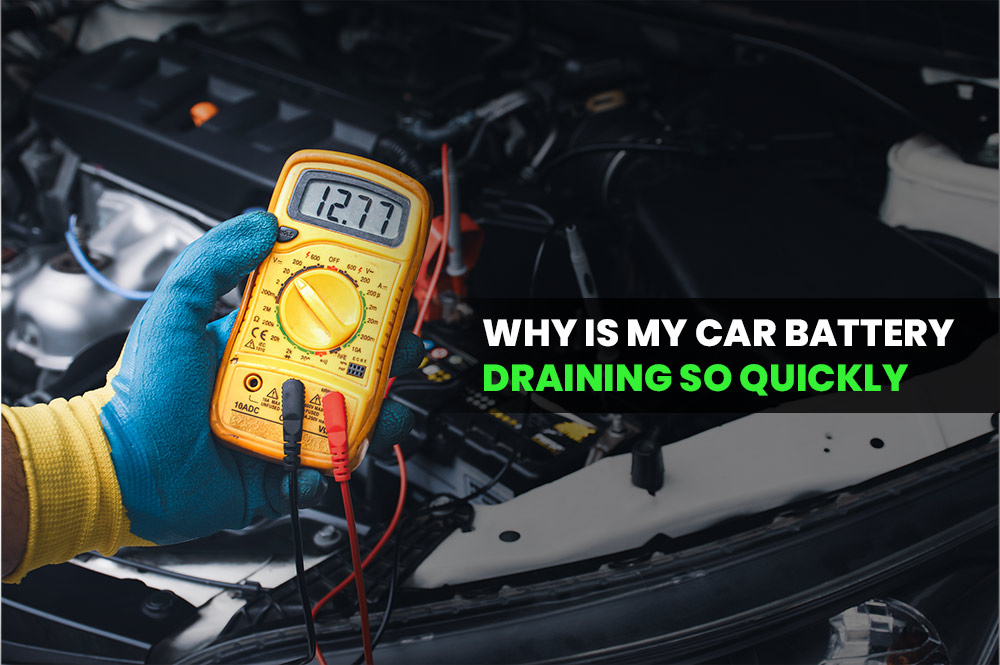Why is My Car Battery Draining So Quickly?

As a car owner in Calgary, Canada, few things are more frustrating than a battery that keeps draining quickly. A dead battery can leave you stranded and disrupt your daily routine. If you find yourself frequently jumping or replacing your car's battery, it's essential to identify and address the underlying cause. Let’s get into some common reasons why your car battery draining faster than expected and provide tips on how to prevent it.
1. Electrical Accessories Left On
One of the most common culprits behind a drained car battery is leaving electrical accessories on when the vehicle is not running. This includes interior lights, headlights, and aftermarket accessories like dash cams or phone chargers. Even a small electrical draw can drain your battery overnight if left unchecked.
To prevent this, always double-check that all lights and accessories are turned off before leaving your car. Additionally, ensure that doors, trunk, and hood are properly closed to avoid any interior lights staying on.
2. Parasitic Battery Drain
Modern vehicles have numerous electronic components that draw a small amount of power from the battery, even when the car is turned off. This is known as a "parasitic drain." While this drain is typically minimal, it can add up over time, especially if there's a faulty component or wiring issue.
Some common causes of parasitic drain include:
- Faulty alternator diodes
- Malfunctioning relay switches
- Electrical shorts or damaged wiring
- Aftermarket accessories with constant power draw
If you suspect a parasitic drain, it's best to have your vehicle inspected by Batteries Store in Calgary. They can perform a battery drain test and pinpoint the source of the issue.
3. Extreme Temperatures
Calgary's harsh winters and hot summers can take a toll on your car's battery. Extreme temperatures can accelerate the chemical reactions inside the battery, leading to faster degradation and reduced lifespan.
In cold weather, a battery's ability to generate power is diminished, making it harder to start the engine. Conversely, high temperatures can cause the battery to overcharge and potentially damage internal components.
To mitigate the effects of extreme temperatures, try to park your car in a garage or shaded area whenever possible. Additionally, consider investing in a battery blanket or insulation kit to protect your battery during the winter months.
4. Old or Faulty Battery
Like any other component, car batteries have a limited lifespan. Most manufacturers recommend replacing the battery every 3-5 years, depending on usage and driving conditions. As a battery ages, its ability to hold a charge diminishes, leading to frequent draining and potential failure.
If your battery is more than 4 years old and showing signs of weakness (e.g., slow cranking, dimming lights), it's likely time for a replacement. Additionally, a faulty or defective battery may drain quickly, even if it's relatively new.
Also read: How Do I Know Which Car Battery Fits My Car?
5. Charging System Issues
Your car's charging system, which includes the alternator and voltage regulator, plays a crucial role in keeping the battery charged while the engine is running. If there's an issue with the charging system, the battery may not be receiving the necessary charge, leading to premature draining.
Common signs of a charging system problem include:
- Battery warning light on the dashboard
- Dimming headlights or interior lights
- Electrical accessories not working properly
If you suspect a charging system issue, it's essential to have it diagnosed and repaired promptly to prevent further damage to the battery and other electrical components.
Also read: How Long Does a Car Battery Last in Canada
Prevention and Maintenance Tips
To help prevent your car battery from draining quickly and extend its lifespan, consider the following tips:
Perform regular battery inspections: Check for corrosion on the terminals, loose connections, and any physical damage to the battery case.
Keep your battery clean: Use a baking soda and water solution to clean the battery terminals and cable connections, ensuring proper electrical contact.
Limit short trips: Frequent short trips can prevent the battery from fully recharging, leading to premature draining. Try to combine errands or take longer drives when possible.
Follow the manufacturer's maintenance schedule: Regular maintenance, including checking the charging system and replacing the battery at the recommended intervals, can help prevent battery issues.
Consider a battery maintainer or trickle charger: If you plan to leave your car unused for an extended period, a battery maintainer or trickle charger can help keep the battery charged and prevent draining.
By understanding the common causes of a quickly draining car battery and taking preventive measures, you can avoid the inconvenience and potential safety hazards associated with a dead battery. If you're still experiencing battery issues or have any concerns, don't hesitate to consult with a professional like a Batteries Store in Calgary for expert advice and assistance.
Remember, a well-maintained battery is essential for a reliable and hassle-free driving experience, especially in Calgary's challenging weather conditions.